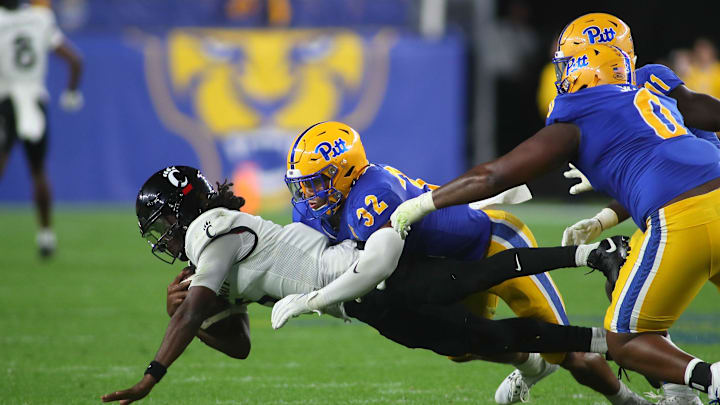River City Rivalry Should Continue for Pitt, Cincinnati

PITTSBURGH -- The matchup between the Pitt Panthers and Cincinnati Bearcats on Sept. 7 at Nippert Stadium in Cincinnati marks the last matchup between the two schools in football in what is known as the River City Rivarly.
The name for the series comes from the Ohio River, which serves as the connection between the two cities. The two cities both have a history of their commerce using the Ohio river to build up their populations and industrial sectors, with steel in Pittsburgh and multiple industries in Cincinnati, including breweries, woodworking, iron produciton, pork packing and cloth production.
Both teams didn't really build a true rivalry with each other until Cincinnati joined the Big East for the 2005 season, which saw the teams play eight consecutive years in incredibly important matchups.
Pitt won the first three matchups, including upsetting No. 17 Cincinnati at home in 2007, coming back from a 17-10 halftime deficit.
Cincinnati then won 28-21 in 2008, holding off a late Pitt comeback to win their first Big East Championship, with fans rushing the field at Nippert Stadium after the game. Cincinnati will also honor that team prior to this season's matchup and even included a $20.08 ticket discount for fans.
The most important matchup came in 2009, with the Panthers hosting the Bearcats in the de facto Big East Championship Game at Heinz Field in the final week of the regular season.
Pitt took a 31-10 lead, but Cincinnati fought back and tied it up at 38-38. Pitt would score with 90 seconds left off a touchdown from running back Dion Lewis, but holder Andrew Janocko mishandled the snap on the point after, which only put them up 44-38.
Cincinnati then moved down the field with ease and quarterback Tony Pike threw a 29-yard touchdown to Armon Binns to tie the game and the successful point-after won them the game, 45-44 and their second straight Big East title.
Pitt would win in 2010, the last game for head coach Dave Wannstedt, which saw the police arrest the Cincinnati Bearcat mascot for encouraging the home fans at Nippert Stadium to throw snow balls at the Pitt players. Cincinnati then won the final two games against Pitt in 2011 and 2012 against head coaches Todd Graham and Paul Chryst.
The River City Rivalry came back last season with Pitt hosting Cincinnati at Acrisure Stadium. Cincinnati took a big lead early and held off a late Pitt comeback to win 27-21. Pitt quarterback Phil Jurkovec completed just 10-of-32 passes and missed all 11 targets to wide receiver Bub Means.
Both teams had a terrible 2023 season, finishing 3-9 and Cincinnati winning just one game in the Big 12. Each team will want to use this game to improve to 2-0 and get back to winning ways.
With this last matchup coming up this weekend, the River City Rivalry might not serve as important as it did during the Big East years, but with conference realignment, the schools would benefit from keeping it going in the future.
The two cities share a great sports history outside of college, with the Pittsburgh Steelers and Cincinnati Bengals in the AFC North Division in the NFL and the Pittsburgh Pirates and the Cincinnati Reds in the NL Central Division in the MLB, which serve fierce rivalries in both football and baseball.
Pitt and Cincinnati are also schools that are alike in many ways, with fanbases of similar sizes and also having to fight to get attention against their NFL counterparts.
They also have to deal with their state school having a bigger fan base and receiving more exposure from the media in Ohio State for Cincinnati and Penn State for Pitt.
Pitt also lacks a true city rivalry amongst their main rivals, with West Virginia, Penn State and Notre Dame either state schools or a large private school.
Syracuse, who Pitt has faced each season since 1955 and is in the ACC, lacks a true rivalry hatred/big game moments like the River City Rivalry has. Syracuse won 16 out of 18 matchups from 1984-2001 and Pitt has won 18 out of the past 22 matchups sine 2002.
The ACC and Big 12 also lack true rivals for Pitt and Cincinnati, respectively. Cincinnati does have West Virginia in the Big 12, but their historic rivalries remain with Louisville, Memphis and Miami (Ohio).
Pitt and WVU will play the next two seasons in the Backyard Brawl, not play from 2026-28, then play again from 2029-32. Pitt and Penn State don't have any scheduled games in the future and Notre Dame's agreement with the ACC means that they only play Pitt six times through 2036.
The Panthers and Bearcats may not play in the same conference anymore, but the two programs should find a way to keep the River City Rivalry going.
It will give the fans that they would want to watch compared to a random Power 4 opponent and a game that both sets of supporters would travel for, as it's only a four and half hour drive between the two cities with no tolls.
College football would benefit as well with the continuation of the cities, as rivlaries make college sports truly great, creating incredible atmospheres, tense moments, brilliant plays and memories that will last a lifetime, both good and bad.
The earliest Pitt and Cincinnati could bring the River City Rivalry back would be 2028, but with football games scheduled years in advance, there's no reason why the two schools shouldn't work together to bring it back sooner rather than later.
Make sure you bookmark Inside the Panthers for the latest news, exclusive interviews, recruiting coverage, and more!
- Pitt’s Damar Hamlin Earns Starting Job With Bills
- Pitt RB Receives National Award Honor
- Pitt Makes Final 3 For 2025 G
- Pitt Four-Star Target Sets Commitment Date
- Former Pitt G Signs Pro Contract Overseas
Follow Inside the Panthers on Twitter: @InsidePitt
